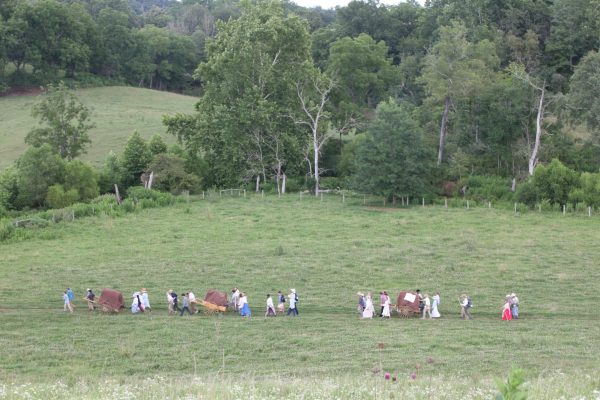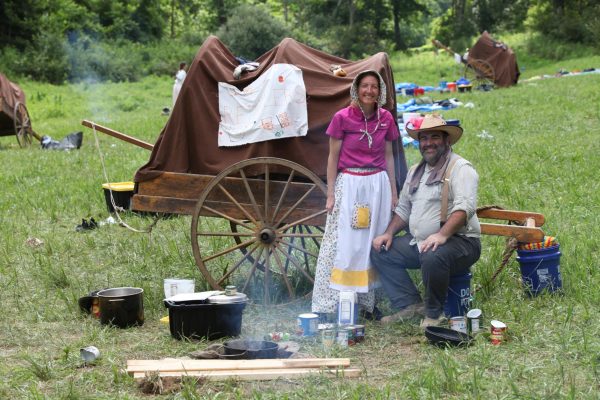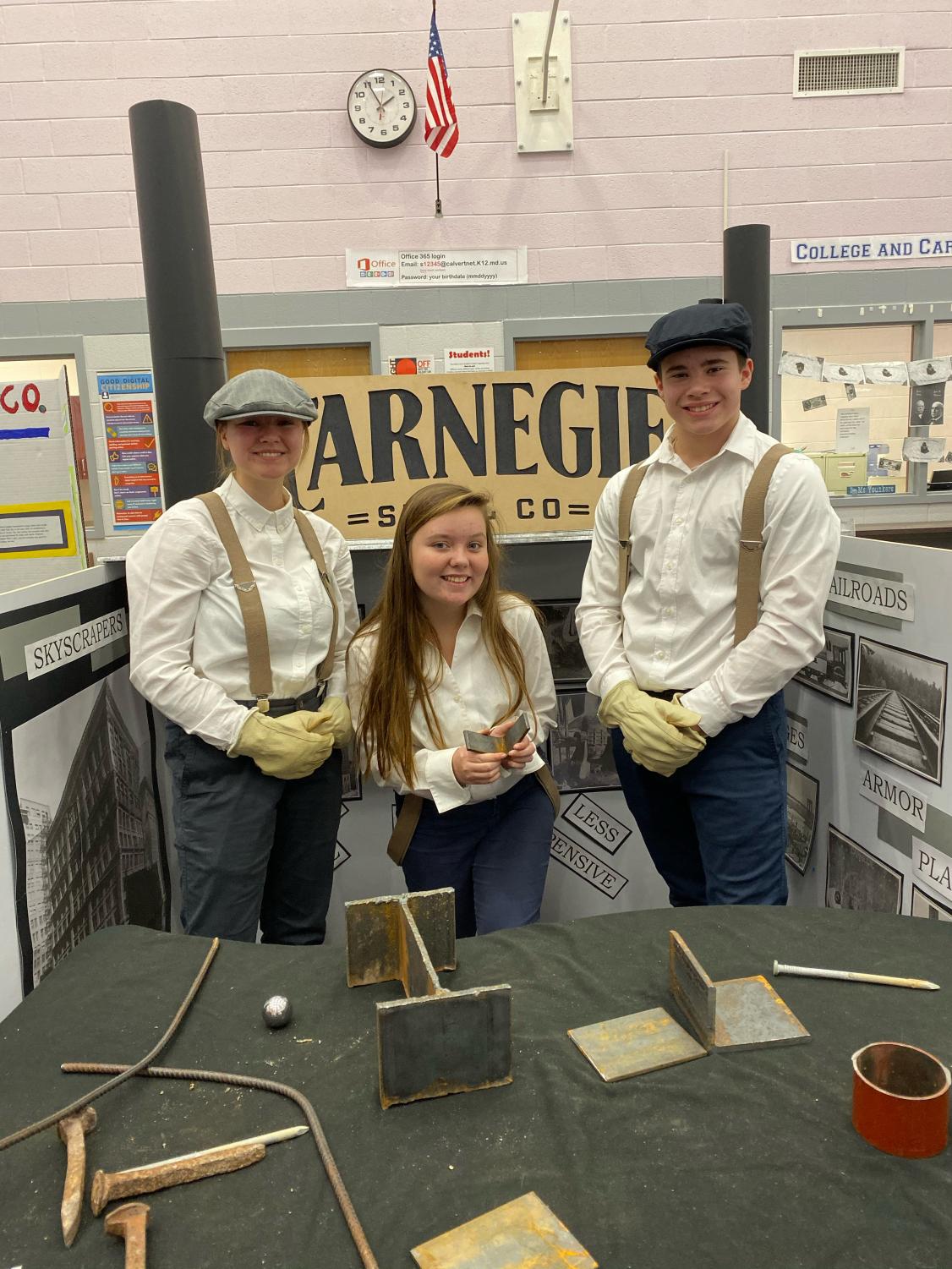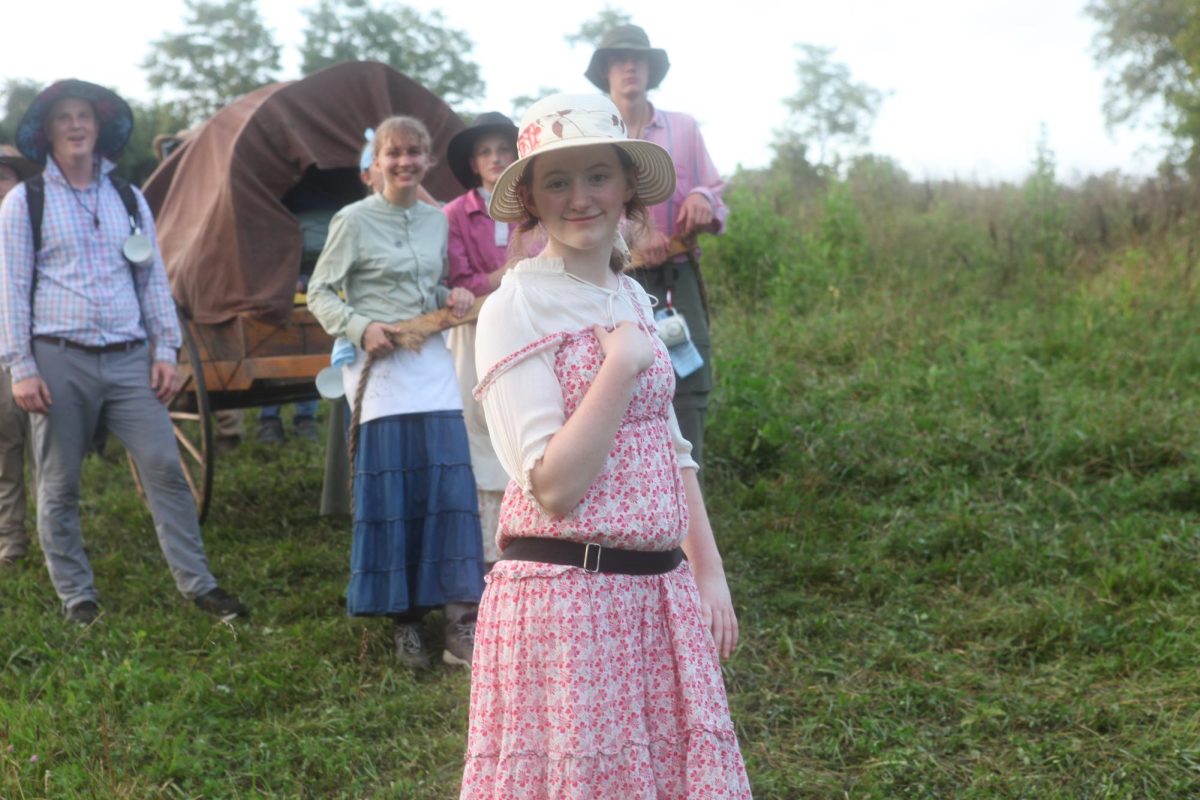If you saw me walking around my neighborhood in early July, you may have been a little confused; a wide-brimmed hat and long skirt aren’t customary garb for American teenagers. I was preparing, along with 150 of my closest friends and nearly twenty Huntingtown students, to participate in a pioneer Trek reenactment.
Each summer, those aged 14-18 in my church gather for a conference. We focus on developing our faith in God. We participate in activities, devotionals, and dances, build relationships, and have a great time. Sometimes these conferences are held on a large scale, with 400-800 youth on a university campus. Other times, they are held in varying forms with 150 participants from local congregations.
This year, our youth conference was three days in the Virginia countryside pulling handcarts. We would dress like pioneers, with aprons, skirts, bonnets, suspenders, and hats. Some were hesitant. We were walking away from running water, beds, roofs, air conditioning, and the technology ever-present in modern life. It wouldn’t be easy, by any means; late July is hot, humid, and prone to bugs and thunderstorms; we slept on tarps under the sky; we would be pulling heavy handcarts up steep hills. Despite these factors, I was mostly excited to learn and have three days where most of my friends would be within walking distance and couldn’t be distracted by their cell phones.
Trek has its history in the history of our church – the Church of Jesus Christ of Latter-day Saints, which took on a massive relocation effort during the nineteenth century. During that time, 70,000 individuals from the American East, Canada, and Northern Europe crossed the Great Plains to the Rocky Mountains with the aim of escaping religious persecution. Reenactments became popular during the late twentieth century, including for youth groups.

We were well-cared for. Our leaders were careful to prioritize health and safety, so there was more than enough food and water, medical personnel on site, and enough people to allow for rest from pulling. It was just a little odd – unorthodox from the world I’d been raised in. For example, the Marriott Ranch where we trekked is a working cattle ranch, so, at one point, a herd of cattle ran across our trail. We had to stay together and wait for them to cross. I also learned quickly to watch for and avoid cow pies – which were far too common. This wasn’t unusual for teenage girls living in the nineteenth century, I’d just never been in a situation like that before.
The bottoms of my shoes began to fall off halfway through the first day. I had an extra pair, but duct tape only held the first so long. On the last night, a thunderstorm woke us at about 3 o’clock in the morning. We weren’t in any danger, but it was funny to realize how odd it was, my friend and I laying essentially in a tarp burrito to stay dry fromthe rain. It was bizarre – comically so.
Trek was certainly hard. Sometimes we’d be pulling our handcart up a hill that was so steep that it seemed like it just went up. Sometimes we’d start to slip backwards – but you couldn’t, because there were people who were dependent on your keeping that handcart from falling backwards. You just kept putting one foot in front of the other, one step at a time. You just kept going. We learned again that we could do hard things and we became less daunted by the big hills.
Said Huntingtown Senior Andrew Lamb, “All the luggage we got was a five-gallon bucket. No phones, no watches, no computers. We all wore thrifted, old-fashioned clothing. We cooked our own food and slept on tarps looking up at the stars. It was really liberating to exist in such a simple way for a few days. Living like that took away a lot of the mental strain that comes from daily life. We worked hard and slept like we meant it.”
One of my favorite parts of Trek was the hoedown. A fiddle group composed of people from our congregations played while we did the Virginia Reel and similar pioneer dances. It was a lovely time. The sun had started to set, things had cooled down, and we were all excited to be past the day’s work. There was energy in the air.
The Marriott Ranch was beautiful beyond description. Every turn looked like a painting out of the Hudson River Art School. We were surrounded by cow pastures, forests, and the Maryland version of mountains – it was panoramic. At night, the stars came out. I could see the Milky Way. At one point I turned around and half the sky was taken up by the Big Dipper. It was just there. It was incredible.
There was a sense of unity that came from working together. We had married couples as our “Mas and Pas” who led a “family” of a dozen youth. Said Mrs. Sarah Huth, who was a Ma, “It is amazing how quickly you can come to love and care for a group of strangers. We worked together to accomplish something really difficult. It was through the challenges and hard tasks that we grew the most. We learned that others care for us, are willing to ease our burdens, and that we can do hard things.” Each individual played a different role, but all had the same goal.
Everyone was willing and enthusiastic to work. We ate together, laughed together, and pulled together. People became much more open about their life experiences. I made new friends and became closer to old ones.

Each of us went on Trek for different reasons. Some went because they genuinely enjoy camping and hiking. Some went to spend time with friends. Some went because their parents made them. Of course, our church leaders had specific religious aims, including helping youth connect with heaven, appreciate the sacrifices of the pioneers, develop faith and hope in Christ, and resolve to become pioneers in their own journey. Walking away from Trek, I think we all learned something about ourselves and our relationship with God.
Despite the bugs and grime, I genuinely enjoyed Trek as an opportunity to grow, learn, and work. I’ll never forget pulling my skirt up and running to catch up with my family, my hair braided and hat flying off. I’ve never felt more like Anne of Green Gables or Laura Ingalls Wilder. I’ll never forget our high spirits and genuine joy or the feeling that permeated the entire endeavor. It was quite the adventure, but it was accomplished just like most things worthwhile – one step at a time.







